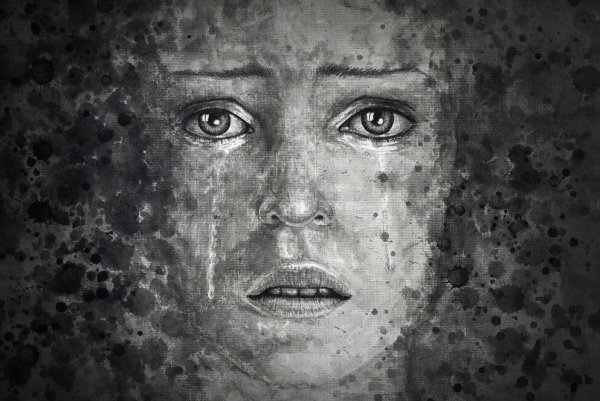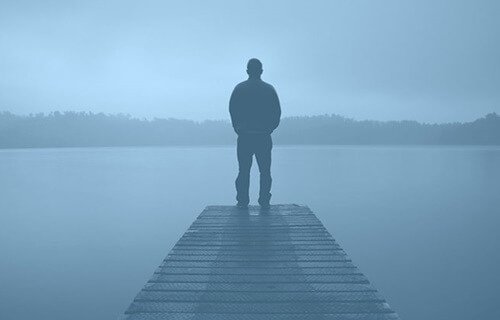The Five Fears All Humans Share

We should never forget the fact that fear is a healthy emotion. It’s part of your survival instincts. Some fears that we all share are perfectly reasonable. In fact, getting rid of them entirely wouldn’t be a good idea. That’s because if you get rid of them, you’d also get rid of your sense of risk and unnecessarily expose yourself to it.
The common fears that all humans share are related to physical preservation and the psychology of integrity and life. They’re universally true because they protect us. They have strong biological and phylogenetic roots.
You might not realize that fear is an impressive force. If you’re aware of it, you can use it to your advantage. People do some ridiculous things out of fear. Nevertheless, they can also channel that fear and use it to create incredible things. Perhaps religion, philosophy, and science are all responses to these fears. They’re just different ways to control them. But what are human beings afraid of in general?
1. Death
This fear is at the heart of our survival instincts. From a biological point of view, life finds a way. All organisms fight death. From a philosophical point of view, life is the greater good, all other goodness and virtue stem from it.
The fear of death also spawns a whole host of other fears that relate to the same idea. We have a fear of heights because we might fall and die. That’s the same reason why we’re afraid of planes, extremely high speeds, etc. These fears are common to all humans and cultures.

2. Loss of autonomy
In other words, we’re talking about being afraid of losing your freedom and the control you have over your actions and thoughts. From a symbolic point of view, this aspect is related to the fear of death. It implies the rejection of the idea of loss of self or the impossibility of uncovering said self.
A lot of other fears stem from this basic fear. For example, the fear of getting stuck under rubble or locked in places with very little oxygen. These are both situations in which a person’s freedom is very limited.
3. Loneliness: One of the five fears humans share
Even more than being afraid of being alone, one of the most common fears is losing touch with the world. Rejection or underappreciation put us on high alert. They’re signs that we might lose our connection with the group and be condemned and ostracized.
Not getting enough recognition and respect leaves an emotional wound that can take a long time to heal. Jealousy and selfishness are emotions that accompany this fear as well. If someone is jealous or envious, it’s because they just fear abandonment.

4. Fear of getting sick or being mutilated
Fear of mutilation is also related to our survival instincts. You need your body to function properly. That’s why we’re afraid of certain instruments such as needles and knives.
The fear of getting sick is also very common. We’re afraid to harm our bodies and don’t want to get in situations that could affect our health and well-being. That’s why we stay away from places that are dirty or wild animals, for example.

5. Humiliation
This is similar to being afraid of loneliness. However, in this case, the fear has more to do with feeling excluded and feeling humiliated in public. No one wants to feel left out or scorned by other people. People are afraid of feeling inferior or dependent.
This fear, as well as being afraid of loneliness, are of a social nature. The more open and diverse a society is, the less fear people experience. On the other hand, this fear is very common in strict and very traditional groups.
These five common fears have been around for a long time. Advertising and propaganda sometimes use these fears to manipulate us. However, human beings are also infinitely intelligent and creative. Thus, we can learn to deal with our fears so they don’t paralyze us and so we don’t succumb to outside pressure.
We should never forget the fact that fear is a healthy emotion. It’s part of your survival instincts. Some fears that we all share are perfectly reasonable. In fact, getting rid of them entirely wouldn’t be a good idea. That’s because if you get rid of them, you’d also get rid of your sense of risk and unnecessarily expose yourself to it.
The common fears that all humans share are related to physical preservation and the psychology of integrity and life. They’re universally true because they protect us. They have strong biological and phylogenetic roots.
You might not realize that fear is an impressive force. If you’re aware of it, you can use it to your advantage. People do some ridiculous things out of fear. Nevertheless, they can also channel that fear and use it to create incredible things. Perhaps religion, philosophy, and science are all responses to these fears. They’re just different ways to control them. But what are human beings afraid of in general?
1. Death
This fear is at the heart of our survival instincts. From a biological point of view, life finds a way. All organisms fight death. From a philosophical point of view, life is the greater good, all other goodness and virtue stem from it.
The fear of death also spawns a whole host of other fears that relate to the same idea. We have a fear of heights because we might fall and die. That’s the same reason why we’re afraid of planes, extremely high speeds, etc. These fears are common to all humans and cultures.

2. Loss of autonomy
In other words, we’re talking about being afraid of losing your freedom and the control you have over your actions and thoughts. From a symbolic point of view, this aspect is related to the fear of death. It implies the rejection of the idea of loss of self or the impossibility of uncovering said self.
A lot of other fears stem from this basic fear. For example, the fear of getting stuck under rubble or locked in places with very little oxygen. These are both situations in which a person’s freedom is very limited.
3. Loneliness: One of the five fears humans share
Even more than being afraid of being alone, one of the most common fears is losing touch with the world. Rejection or underappreciation put us on high alert. They’re signs that we might lose our connection with the group and be condemned and ostracized.
Not getting enough recognition and respect leaves an emotional wound that can take a long time to heal. Jealousy and selfishness are emotions that accompany this fear as well. If someone is jealous or envious, it’s because they just fear abandonment.

4. Fear of getting sick or being mutilated
Fear of mutilation is also related to our survival instincts. You need your body to function properly. That’s why we’re afraid of certain instruments such as needles and knives.
The fear of getting sick is also very common. We’re afraid to harm our bodies and don’t want to get in situations that could affect our health and well-being. That’s why we stay away from places that are dirty or wild animals, for example.

5. Humiliation
This is similar to being afraid of loneliness. However, in this case, the fear has more to do with feeling excluded and feeling humiliated in public. No one wants to feel left out or scorned by other people. People are afraid of feeling inferior or dependent.
This fear, as well as being afraid of loneliness, are of a social nature. The more open and diverse a society is, the less fear people experience. On the other hand, this fear is very common in strict and very traditional groups.
These five common fears have been around for a long time. Advertising and propaganda sometimes use these fears to manipulate us. However, human beings are also infinitely intelligent and creative. Thus, we can learn to deal with our fears so they don’t paralyze us and so we don’t succumb to outside pressure.
This text is provided for informational purposes only and does not replace consultation with a professional. If in doubt, consult your specialist.







